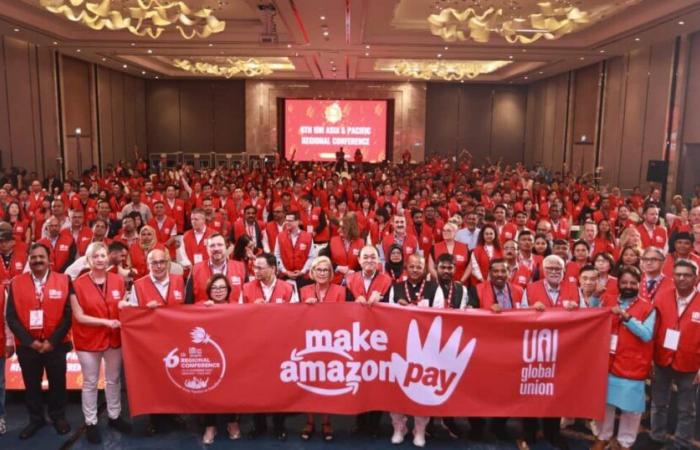
From Black Friday to Cyber Monday, traditionally one of the biggest shopping weekends of the year, Amazon workers and their allies on six continents are ready to strike and protest under the banner “Make Amazon Pay” (Make Amazon Pay). Under the aegis of UNI Global Union and Progressive International, the “Make Amazon Pay” days of resistance, which will take place from November 29 to December 2, aim to hold Amazon accountable for labor abuses, degradation of the environment and threats to democracy.
Unions and tax justice, anti-poverty and garment workers’ rights groups, among others, are planning protests in more than 20 countries, including major cities in the United States, from Germany, the United Kingdom, Japan and Brazil. This year, thousands of German workers will also go on strike in Graben, Dortmund Werne, Bad Hersfeld, Leipzig, Koblenz and at the Rheinberg warehouse. In New Delhi, hundreds of Amazon workers will rally to demand fair treatment, given Amazon’s mistreatment of workers during last summer’s heatwave. In France, Attac, the Association for the Taxation of Financial Transactions and for Citizen Action, will organize demonstrations in several cities in France. Garment workers will also take to the streets in Bangladesh.
This is the fifth year of “Make Amazon Pay” actions, which begin on Black Friday, or “Make Amazon Pay Day,” and continue throughout the weekend. The campaign electrified the movement to hold Amazon accountable around the world. In previous years, thousands of workers went on strike at factories in Germanyin France, Spain, the United Kingdom and Italy; garment workers took to the streets in Bangladesh; workers in the United States staged walkouts; civil society allies organized protests projecting the “Make Amazon Pay” logo at Amazon offices around the world, projecting “pandemic profiteer” on Jeff Bezos’ mansion; and climate activists blocked Amazon warehouses in three European countries.
“Amazon’s relentless pursuit of profit comes at the expense of workers, the environment and democracy“, said Christy Hoffman, general secretary of the UNI Global union . “Bezos’ company has spent untold millions to prevent workers from organizing, but the strikes and protests taking place around the world show that workers’ desire for justice – for union representation – cannot be arrested. We are united in demanding that Amazon treat its workers fairly, respect basic rights, and stop undermining the systems meant to protect us all. Make Amazon Pay Day is becoming a global act of resistance against Amazon’s abuse of power.
Recent events have highlighted Amazon’s influence on our democracies. Reports reveal that Amazon underreported its lobbying spending in Europe by millions, and its refusal to participate in public hearings led the European Parliament to ban the company’s lobbyists. In the United States, Amazon’s lawsuits challenging the constitutionality of the National Labor Relations Board (NLRB) threaten to weaken protections for all American workers.
Amazon’s aggressiveness towards unions is being questioned around the world. In the United States, Amazon’s tactics against Alabama warehouse workers have been so extreme that the federal government invalidated an initial union vote, forcing a second election and now a third. To this day, the “captive audience” meetings that Amazon and other companies use to discourage union organizing are illegal. In Canada, Germany and the United Kingdom, Amazon has been accused of intimidating workers to prevent them from unionizing. For example, the German union ver.di has spent a decade urging Amazon to comply with collective bargaining standards, while in the UK, Amazon workers face intense anti-union campaigns. In India, workers from the Amazon India Workers Association, supported by the UNI Global union, are demanding better working conditions in extreme heat.
A global day of resistance
“Amazon is everywhere, but so are we. By uniting across borders, we can not only force Amazon to change the way it does things, but lay the foundation for a world that prioritizes human dignity, and not Jeff Bezos’ bank balance,” said Varsha Gandikota-Nellutla, Deputy General Coordinator of Progressive International.
The campaign’s demands also resonated with regulators and encouraged progressive legislative victories. In the United States, several states, including California, Minnesota, Oregon, New York and Washington, have passed laws directly addressing working conditions in Amazon’s pressurized warehouses. In the United Kingdom, a bill on workers’ rights, which simplifies the procedure for recognizing unions, is currently the subject of a parliamentary debate, while the European Union is investigating Amazon’s practices in this area. security across the continent.
Convened by UNI Global Union and Progressive International, the Make Amazon Pay campaign brings together more than 80 unions, civil society organizations, environmentalists and tax watchdogs, including UNI Global Union, Progressive International, Greenpeace, 350.org, Tax Justice Network and Amazon Workers International. The campaign is built around a set of common demands: Amazon must pay its workers fairly and respect their right to unionize, pay its fair share of taxes, and commit to true environmental sustainability.
About Make Amazon Pay
Make Amazon Pay Day was launched on Black Friday in 2020 by UNI Global Union and Progressive International. Each year, the movement has expanded, bringing together a growing coalition of unions, activists and allies demanding that Amazon prioritize people over profits. With the participation of more than 30 labor unions, environmental organizations, and civil society groups, Make Amazon Pay Day challenges Amazon’s power with a unified call for systemic change.





